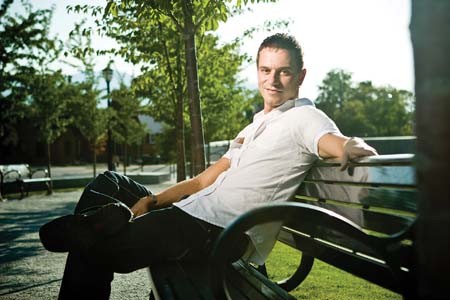Page 2 of 3
From Defense to OffenseWill Carlson recalls that when he first began working for Equality Utah in 2006, he found he was spending all of his time trying to defeat bills targeting the LGBT population. The game has changed, and not even four years later, Carlson can say, “Now we’re talking about basic protections every human is entitled to.”
“There’s a big difference between now and five years ago,” notes Valarie Larabee, executive director of the Utah Pride Center. “The level of awareness and competency on LGBT issues has risen dramatically. The conversation has become much more sophisticated.”
Whipple sums up the situation by noting that during the last legislative session, “Nothing passed, but nothing was brought against us, either.”
It should also be noted that, from a national perspective, Salt Lake City’s gay community is seen as a surprisingly forceful presence even while, as Larabee says, “sitting in the shadows of the world headquarters of the Mormon Church.” In a July 13, 2009, article for the liberal Nation magazine, New York University professor Lisa Duggan, who describes herself as “a leftist and a New York City dyke,” wrote about her visit to Salt Lake City. She said she was “repeatedly blown away by the progressive politics and outright queerness of the capital city.” She was so impressed, she suggested doing “something truly weird and definitely queer: Look to Utah for inspiration.”

That said, this is still Utah, whose conservative Republicans helped pass a constitutional ban on gay marriage. While every state in the union differs in its LGBT laws, court cases and issues, conservative strongholds like Utah face different challenges than more liberal enclaves. Thus, it’s difficult to forge a national consensus or movement, and groups in individual states are left to do what they can with what they have.
“I was hoping for more like an NAACP or an alliance of churches fighting together in a unified way,” Whipple says of the way the movement has developed. “Instead, we’ve just got a bunch of local grass-roots activists. It’s just something different. The problem is, the states are so divided and so unique. Everyone’s still trying to fight for something different.”
And in Utah, that fight will not be about gay marriage any time soon.
Jobs Before Matrimony
“Amendment 3 is a super-DOMA, so gay marriage is not a possibility. It would be fruitless. It’s not part of the agenda.”
The previous quote comes not from a gay-marriage opponent but, rather, Brandie Balken, interim-executive director of Equality Utah. Considering what happened in the 2009 legislative session, it makes political sense for the organization to take that position. One of the primary oppositions legislators had to the Common Ground bills was that, to conservatives, they represented a slippery slope to gay marriage. For 2010, Equality Utah wants to see the Common Ground bills advance in the Legislature with the focus on issues that are less polarizing than gay marriage.
“Marriage is a red herring,” Carlson says. “Polls show there are two areas of the Common Ground Initiative that an overwhelming majority of Utahns support: fair work and health care. Utahns in general are behind us on those issues. Now we just need to get the elected officials up to speed with their constituents.”
Rep. Christine Johnson, D-Salt Lake, one of three openly gay members of the Legislature, will be pursuing legislation in the 2010 session similar to bills she has run in the past two sessions to end anti-gay workplace and housing discrimination. “Those who live in a very conservative district have a right, and a duty, to represent their constituency,” she says. But even in some traditionally conservative districts, “while people are not supportive of marriage equality, they also really believe people shouldn’t be fired because of sexual orientation.”
The difficulty for her conservative colleagues is not supporting basic human rights, it’s the fear that small steps will lead to big leaps. Rep. Greg Hughes, R-Draper, leader of the Legislature’s Conservative Caucus, agrees that a majority of his constituents think gays and lesbians should have the same fair-housing protections as everyone else, and says, “I have no desire to withhold housing rights” or other civil rights from the LGBT population. dditionally, in his property management business, he regularly rents to LGBT tenants.
However, that doesn’t mean he’s going to vote for a bill extending housing rights.
“If
it were a bill that I knew could be contained to that one issue, that
would be OK,” he says. “But I’m afraid it might bleed over into other
areas, and those questions haven’t been answered to my satisfaction.”